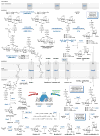Bacterial cell-wall recycling
- PMID: 23163477
- PMCID: PMC3556187
- DOI: 10.1111/j.1749-6632.2012.06813.x
Bacterial cell-wall recycling
Abstract
Many Gram-negative and Gram-positive bacteria recycle a significant proportion of the peptidoglycan components of their cell walls during their growth and septation. In many--and quite possibly all--bacteria, the peptidoglycan fragments are recovered and recycled. Although cell-wall recycling is beneficial for the recovery of resources, it also serves as a mechanism to detect cell-wall-targeting antibiotics and to regulate resistance mechanisms. In several Gram-negative pathogens, anhydro-MurNAc-peptide cell-wall fragments regulate AmpC β-lactamase induction. In some Gram-positive organisms, short peptides derived from the cell wall regulate the induction of both β-lactamase and β-lactam-resistant penicillin-binding proteins. The involvement of peptidoglycan recycling with resistance regulation suggests that inhibitors of the enzymes involved in the recycling might synergize with cell-wall-targeted antibiotics. Indeed, such inhibitors improve the potency of β-lactams in vitro against inducible AmpC β-lactamase-producing bacteria. We describe the key steps of cell-wall remodeling and recycling, the regulation of resistance mechanisms by cell-wall recycling, and recent advances toward the discovery of cell-wall-recycling inhibitors.
© 2012 New York Academy of Sciences.
Conflict of interest statement
The authors declare no conflicts of interest.
Figures









References
-
- Bugg TDH, Braddick D, Dowson CG, Roper DI. Bacterial cell wall assembly: Still an attractive antibacterial target. Trends Biotechnol. 2011;29:167–173. - PubMed
-
- Park JT. Why does Escherichia coli recycle its cell wall peptides? Mol Microbiol. 1995;17:421–426. - PubMed
-
- Dworkin J, Shah IM. Exit from dormancy in microbial organisms. Nat Rev Microbiol. 2010;8:890–896. - PubMed
-
- Keep NH, Ward JM, Cohen-Gonsaud M, Henderson B. Wake Up! Peptidoglycan lysis and bacterial non-growth states. Trends Microbiol. 2006;14:271–276. - PubMed
Publication types
MeSH terms
Substances
Grants and funding
LinkOut - more resources
Full Text Sources
Other Literature Sources

